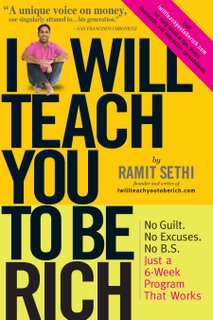Young adults urged to smarten their money habits


A convenient guest post from the AP that covers not just one, but TWO, finance books:
Young adults urged to smarten their money habits
By EILEEN AJ CONNELLY
AP Personal Finance Writer
NEW YORK — Saddled with student loans and credit card debt and addicted to $4 lattes, do young adults stand a financial chance?
Two new books aim to give the Millennial generation the information they need to set themselves on the right path, using strikingly different approaches.
In "I Will Teach You to Be Rich," author Ramit Sethi writes with a laid back, irreverent style that has made his five-year-old blog of the same name popular. While Beth Kobliner, in an update of her 1996 best-seller "Get a Financial Life," uses a more sober tone. But both authors are serious about trying to nudge, push or cajole young people into paying attention to money matters to provide themselves with long-term financial security.
"The point of this book is behavioral change," Sethi said in a recent interview. He hopes that by using language and situations young people are comfortable with, his message will get through. Personal finance advice is typically aimed at older people, he said, and can often seem like "old white guys talking (about) confusing subjects."
"It's not broken out in a way that we care about," the 26-year-old said.
Sethi aims at helping young people achieve both short-term goals — buying a new iPhone or taking a dream vacation — and long-term goals like paying off debt and saving for retirement.
The book offers a six week program that takes readers step by step through setting up banking and investment accounts, paying down debt and improving credit scores. And it advocates what Sethi calls "conscious spending," meaning an awareness of where money is going and why.
Sethi does not advocate a step that Kobliner suggests: keeping a log of daily spending to track where money goes. "You obviously need to be aware of what you're spending, but should you be aware of it on a day to day basis?"
Kobliner doesn't think such an exercise is necessary for the long term. But she maintains that for a week or two, writing down every dollar (or keeping track of spending in the Blackberry notes function) can be an eye-opener. "It sounds so obvious, but I think the revelation that people have when they do that is pretty amazing," she said in an interview.
Kobliner's book offers both an overview to give readers a quick start toward understanding their finances, and substantial detail on topics such as banking and investing, along with intensive run-downs on mortgages, insurance and taxes. Young military families may also be interested in her chapter on military benefits.
As for those lattes, Sethi breaks with the personal finance pack when he says it's perfectly OK to keep high-priced coffee habit or even to spend hundreds on Jimmy Choo shoes — as long as the bills are paid, the 401(k) contributions are flowing in and the savings accounts are set up. "Personal finance I think traditionally has been so much about people telling you not to do things," he said. "Not to buy lattes, not to buy $150 jeans or enjoy going out to eat. Personal finance is not about more and more willpower."
Kobliner also supports the concept of "mindful spending," but offers a somewhat more traditional approach. She suggests that readers identify short-term and long-term goals, and find ways to cut spending so they can reach them. "I hate the clichéd advice," she said. "But it's true, you have to have a one-time sit down and ask, 'Where do I want to be? What are my goals?'"
"Thinking that through is very helpful for people because then it gives you something concrete to work toward," she said.
When it comes to the crushing debt load that young people carry, both writers offer similar approaches for how to get out from under it, including suggestions on how to talk to credit card companies and consolidating student debt.
And they both focus on built-in saving and investing. "I think it's human nature to want to spend what you have," said Kobliner. "It's so important to build savings into your budget."
Looking ahead, they also agree that the current financial crisis may have an upside. "If there's any silver lining in this (economic) frenzy that we're in now, I think it's going to force some awareness with this generation," said Kobliner. When her book was first issued, she recalled, many said young people didn't care about the topic. "Now I think it's clear, not only do young people care about it, but they have to care about it."
Labels: Beth Kobliner, Get a Financial Life, I Will Teach You to Be Rich, Ramit Sethi
 RSS
RSS



0 Comments:
Post a Comment
<< Home